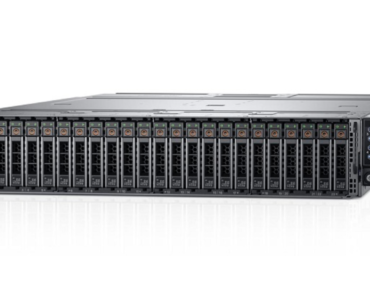Dell’s AMD-Powered Server Line Targets High-End Jobs

Source: Dell EMC
Dell Technologies rolled out redesigned servers this week based on AMD’s latest Epyc processor that are geared toward data-driven workloads running on increasingly popular multi-cloud platforms.
Dell, which has seen its lead shrink in the contracting global server market, is banking on AMD’s 7-nm Rome server processor introduced in August to provide the bandwidth and computational horsepower needed to scale enterprise cloud deployments. That, the server maker (NYSE: DELL) said, would allow “dynamic workload scaling” for HPC, data analytics and other emerging workloads.
The rollout announced Tuesday (Sept. 17) includes a pair of single-socket and three dual-socket PowerEdge servers based on AMD’s (NASDAQ: AMD) second-generation Epyc processor. Dell sought to avoid “a cookie cutter approach wherein we [would] presume that a particular server platform can meet the needs of every single workload, and that's where the differentiation comes in,” said Ravi Pendekanti, Dell’s senior vice president for server infrastructure products.
“It’s really about balancing the system design to leverage” the second-generation Rome processor, added David Schmidt, Dell’s product manager.
The company also claimed series of performance records based on the TPC benchmark for its one- and two-socket PowerEdge servers, including a 280-percent performance increase in virtual machine density for running databases.
With an eye on HPC going mainstream, Pendekanti said the high-end, two-socket model achieved 3,462 Gflops, representing a more than 200-percent performance upgrade based on the LINPACK benchmark. Those performance benchmarks grew out of earlier development at Dell EMC’s recently formed HPC and AI Innovation Lab.
Pendekanti also noted the server security features provided by AMD’s second-generation Rome processor, including encrypted virtualization and memory encryption. Hence, server security would extend “all the way from the firmware up through the higher levels of ecosystem,” he said.
As bandwidth demands grow in enterprise datacenters, Dell said its new servers would deliver an up to 26-percent increase in PCI Express lanes, resulting in a 60-percent faster interconnect fabric. The new server line includes PCIe 4.0 interconnects to help avoid growing network bottlenecks.
Along with the server rollout, Dell also said it has completed integration of its OpenManage enterprise ecosystem that includes Microsoft (NASDAQ: MSFT) systems and VMware vSphere. The combination is designed to ease datacenter management of physical and virtual server infrastructure. Other components include open API development with Rackspace and integration of IBM/Red Hat’s Ansible IT automation and DevOps tool.
Dell said its single-socket PowerEdge servers based on Rome are available now. Two of three dual-socket versions, including one targeting HPC workloads will be available in October. A final high-end version will be released early next year.
Among the targeted HPC applications are manufacturing, climate research and genomics workloads, the server maker said. The new servers also include GPU support for AI and machine learning workloads, Dell noted.
Related
George Leopold has written about science and technology for more than 30 years, focusing on electronics and aerospace technology. He previously served as executive editor of Electronic Engineering Times. Leopold is the author of "Calculated Risk: The Supersonic Life and Times of Gus Grissom" (Purdue University Press, 2016).











